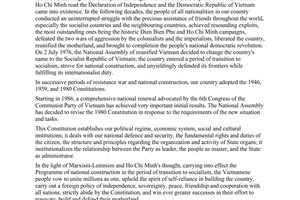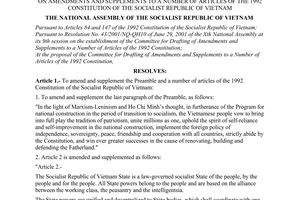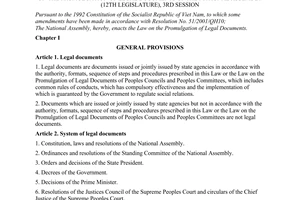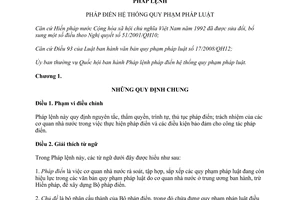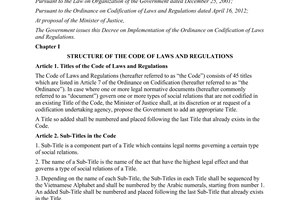Nội dung toàn văn Ordinance No. 03/2012/UBTVQH13 on legitimate typification of legal norms system
|
THE NATIONAL
ASSEMBLY
|
SOCIALIST
REPUBLIC OF VIETNAM |
|
Ordinance No. 03/2012/UBTVQH13 |
Hanoi, April 16, 2012 |
ORDINANCE
ON LEGITIMATE TYPIFICATION OF LEGAL NORMS SYSTEM
Pursuant to the 1992 Constitution of the Socialist Republic of Vietnam, which was amended and supplemented a number of articles under the Resolution No. 51/2001/NQ-QH10 bổ sung điều của Hiến pháp nước cộng hoà xã hội chủ nghĩa Việt Nam năm 1992">51/2001/QH10;
Pursuant to Article 93 of Law No. 17/2008/QH12 on Promulgation of Legal Documents;
The National Assembly Standing Committee promulgates the Ordinance on legitimate typification of legal norms system,
Chapter I
GENERAL PROVISIONS
Article 1. Scope of adjustment
This Ordinance stipulates principles, competence, order and procedures of legitimate typification; responsibilities of state agencies for legitimate typification and conditions ensuring legitimate typification.
Article 2. Interpretation of terms
In this Ordinance, the terms below are construed as follows:
1. Legitimate typification means state agencies' review, collection and arrangement of effective legal norms in legal documents promulgated by central state agencies other than the Constitution in order to formulate the legitimately typified Code.
2. Topic means a part of the legitimately typified Code, which contains legal norms adjusting certain groups of social relations identified by field.
3. Heading means a constituting part of a topic, which contains legal norms adjusting a certain group of social relations.
Article 3. Principles of legitimate typification
1. Not to alter the contents of legal norms being typified formally.
2. To follow the descending order of legal effect of legal norms.
3. To update newly promulgated legal norms in the legitimately typified Code and to remove the invalid legal norms from the legitimately typified Code.
4. To observe the competence, order and procedures for the legitimate typification.
Article 4. Competence of legitimate typification
1. Ministries and ministerial-level agencies shall implement legitimate typification for legal norms in legal documents promulgated by themselves or drafted under their charge; legal norms in legal documents adjusting matters under their state management, which are submitted by agencies, organizations or National Assembly deputies.
2. The Supreme People's Court, the Supreme People's Procuracy and the State Audit of Vietnam shall implement legitimate typification for legal norms in legal documents promulgated by themselves or drafted under their charge; legal norms in legal documents adjusting matters in the fields of their operation, which are submitted by agencies, organizations or National Assembly deputies.
3. The National Assembly Office shall implement legitimate typification for legal norms in legal documents promulgated by the National Assembly or the National Assembly Standing Committee, which adjust matters other than competence of the state agencies specified in Clauses 1 and 2 of this Article to implement legitimate typification.
4. The President Office shall implement legitimate typification for legal norms in legal documents promulgated by the President and not be competence of the state agencies specified in Clauses 1 and 2 of this Article to implement legitimate typification.
Article 5. Use of the legitimately typified Code
The legitimately typified Code formulated under this Ordinance is the official typified code of the State for reference in law application and enforcement.
Chapter II
LEGITIMATELY TYPIFIED CODE AND ORDER AND PROCEDURES OF LEGITIMATE TYPIFICATION
Article 6. Structure of the legitimately typified Code
1. The legitimately typified Code is structured by topic. Each topic may contain one or more than one heading. Depending on its contents, each heading may contain parts, chapters, sections, articles, clauses and points.
2. Headings, parts, chapters, sections, articles, clauses and points of the legitimately typified Code are numbered and must have indications if they relate to other contents of the legitimately typified Code.
Articles in the legitimately typified Code have symbols for distinguishing forms of legal documents and are noted for identifying provisions of legal documents being legitimately typified.
3. The Government shall detail this Article.
Article 7. Topics of the legitimately typified Code
Topics of the legitimately typified Code are stipulated and arranged as follows:
1. National security;
2. Insurance;
3. Post and telecommunications;
4. Judicial support;
5. Cadres, civil servants and public employees,
6. Social policies;
7. Industry;
8. Population, family, children, gender equity;
9. Civil matters;
10. Ethnic minorities;
11. Land;
12. Enterprises, cooperatives;
13. Education and training;
14. Transport and communications;
15. Judicial administration;
16. Criminal matters;
17. Accounting and audit;
18. Complaints and denunciations;
19. Science and technology;
20. Labor;
21. Environment;
22. Bank, monetary;
23. Foreign relations, treaties;
24. Agriculture and rural areas;
25. National defense;
26. Finance;
27. Natural resources;
28. Public property, public debts, national reserves;
29. Emulation, commendation, state-honored titles;
30. Execution of court judgments;
31. Statistics;
32. Information, press, publication;
33. Taxes, charges, fees and other revenues;
34. Trade, investment, securities;
35. Organizational structure of State apparatus;
36. Socio-political organizations, associations;
37. Legal procedures and modes of dispute settlement;
38. Religions and beliefs;
39. Social order and safety;
40. Judicial assistance;
41. Culture, sports and tourism;
42. Clerical and archival matters;
43. Construction, dwelling-house, urban areas;
44. Law formulation and enforcement;
45. Health, pharmacy.
Article 8. Addition of new topics, roadmap to formulate the legitimately typified Code and assignment of agencies implementing legitimate typification
1. The Government shall decide to add new topics at the proposal of the Minister of Justice.
2. The Prime Minister shall decide on the roadmap to formulate the legitimately typified Code.
3. Pursuant to Article 4 of this Ordinance and at the proposal of the Minister of Justice, the Prime Minister shall assign agencies implementing legitimate typification for each heading (hereinafter referred to as heading-based legitimate typification).
Article 9. Heading-based legitimate typification
1. Heading-based legitimate typification is performed as follows:
a/ To structure a heading based on the structure of the legal document with the highest legal effect adjusting the group of social relations under that heading; when necessary, the agency implementing legitimate typification may add parts, chapters and sections to the heading structure;
b/ To collect and classify legal documents under the heading; to review to remove contents not containing legal norms or no longer effective; to detect legal norms that are inconsistent with reality, overlapping or conflicted, in order to handle them according to competence;
c/ To collect effective legal norms and arrange them in the descending order of legal effect of documents containing them; to arrange detailing and guiding legal norms right after detailed and guided legal norms.
2. The agency implementing legitimate typification shall propose competent state agencies to handle legal norms that are inconsistent with reality, overlapping or conflicted.
3. The Government shall detail this Article.
Article 10. Appraisal of heading-based legitimate typification result
1. The Minister of Justice shall form an Appraisal Council to appraise heading-based legitimate typification results.
The chairman of Appraisal Council is the Minister of Justice. Members of Appraisal Council include representatives of leaders of the agency implementing legitimate typification, the National Assembly's Law Committee, related agencies and organizations, and legal experts.
2. Appraisal of heading-based legitimate typification results concentrates on the following matters:
a/ Accuracy and completeness of legal norms in the heading;
b/ Appropriateness of positions of legal norms in the heading;
c/ Observance of the order and procedures for heading-based legitimate typification;
d/ Other matters related to the contents of the heading.
3. Conclusions of the Appraisal Council shall be sent to the agency implementing legitimate typification within 30 days after receiving the dossier of request for appraisal.
Article 11. Finalization and signing for certification of heading-based legitimate typification results and arrangement of headings in topics
1. Within 15 days after receiving the Appraisal Council's conclusions, the agency implementing legitimate typification shall adjust and finalize heading-based legitimate typification results.
2. The head of agency implementing legitimate typification shall sign to certify heading-based legitimate typification results and send them to the Ministry of Justice.
3. The Ministry of Justice shall arrange headings being legitimately typified in topics.
4. The Government shall detail this Article.
Article 12. Approval of topic-based legitimate typification results and arrangement in the legitimately typified Code
1. The Government shall approve topic-based legitimate typification results of the legitimately typified Code at the proposal of the Minister of Justice.
2. The Ministry of Justice shall arrange approved topic-based legitimate typification results in the legitimately typified Code and publish them on the legitimate typification website.
Article 13. Updating of new legal norms and headings in the legitimately typified Code
1. New legal norms shall be updated in the legitimately typified Code as follows:
a/ When a newly promulgated, amended, supplemented, replaced or annulled legal norm is under a heading of a topic, the agency implementing legitimate typification shall identify the corresponding legal norm in the legitimately typified Code, implement legitimate typification for the new legal norm and send a dossier to the Ministry of Justice;
b/ The Ministry of Justice shall examine the dossier and update the new legal norm in the legitimately typified Code or remove the invalid legal norm from the legitimately typified Code.
2. New headings shall be added to the legitimately typified Code as follows:
a/ When a newly promulgated legal norm is not under any headings of the legitimately typified Code, an agency specified in Article 4 of this Ordinance shall propose in writing the title and position of a new heading to the Ministry of Justice. The Ministry of Justice shall consider and propose the Prime Minister to add such heading and assign the implementing agency;
b/ The legitimate typification order and procedures for a new heading comply with Articles 9, 10 and 11 of this Ordinance.
3. New legal norms and headings shall be updated in the legitimately typified Code at the time of their effect.
4. The Government shall detail this Article.
Article 14. Correction of errors, maintenance of the legitimately typified Code on the legitimate typification website
1. Agencies, organizations or individuals that detect errors in the legitimately typified Code shall send their proposals to the Ministry of Justice. The Ministry of Justice shall assume the prime responsibility for, and coordinate with agencies implementing legitimate typification, in considering these proposals for correction of errors.
2. The legitimately typified Code shall be maintained constantly on the legitimate typification website and may be used for free. The State holds the copyright to the legitimately typified Code.
Chapter III
AGENCIES' RESPONSIBILITIES FOR LEGITIMATE TYPIFICATION AND ASSURANCE OF FUNDS FOR LEGITIMATE TYPIFICATION
Article 15. Responsibilities of the Ministry of Justice
1. To propose competent agencies to promulgate or promulgate under its competence legal documents on legitimate typification.
2. To guide the legitimate typification; to provide professional training and retraining for officers in charge of legitimate typification.
3. To examine and urge agencies implementing legitimate typification in making legitimate typification.
4. To settle under its competence or propose the Government or the Prime Minister to settle problems relating to legitimate typification.
5. To make a plan on formulation of the legitimately typified Code and submit it to the Prime Minister for approval.
6. To develop a legitimate typification website; to constantly maintain the legitimately typified Code on the legitimate typification website; to manage and promulgate regulations on mobilization of social resources for publishing the legitimately typified Code in form of written.
7. To annually report on legitimate typification work to the Government.
Article 16. Responsibilities of agencies implementing legitimate typification
1. To make heading-based legitimate typification as assigned by the Prime Minister.
2. To ensure the accuracy and completeness of codified legal norms in headings.
3. To promptly make proposals and implement legitimate typification for new legal norms and headings.
4. To assure conditions for legitimate typification.
Article 17. Funds for legitimate typification
1. State budget funds shall be allocated for legitimate typification, including:
a/ Funds for legitimate typification, appraisal, updating of new legal norms and headings, and management and maintenance of the legitimately typified Code, shall be included in annual budget estimates of agencies implementing legitimate typification;
b/ Funds for the formulation of the legitimately typified Code shall be allocated under the project on formulation of the legitimately typified Code.
2. The Ministry of Finance shall assume the prime responsibility for and coordinate with the Ministry of Justice in specifying the use of funds for legitimate typification.
Chapter IV
IMPLEMENTATION PROVISIONS
Article 18. Effect
This Ordinance takes effect on July 1, 2013
|
|
ON BEHALF OF
THE NATIONAL ASSEMBLY |
------------------------------------------------------------------------------------------------------
This translation is made by LawSoft and
for reference purposes only. Its copyright is owned by LawSoft
and protected under Clause 2, Article 14 of the Law on Intellectual Property.Your comments are always welcomed
